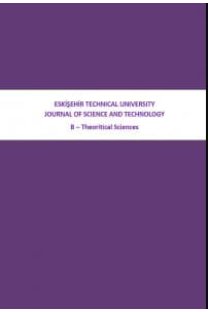TiO2 FILMS WITH VARIOUS CRYSTAL STRUCTURES FOR SINGLE AND BILAYER PHOTOANODES OF DYE-SENSITIZED SOLAR CELLS
Titanium dioxide, Dye-sensitized solar cells, Bilayer photoanode, Nanoparticles
___
- Small Spacecraft Technology State of the Art, Mission Design Division, Ames Research Center, Moffett Field, California, 2015, NASA/TP–2015–216648/REV1.
- Jean J, Brown PR, Jaffo RL, Buonassisi T, Bulovié V. Pathways for solar photovoltaics, Energy and Environ Sci 2015; 4.
- O’Regan B, Gratzel M. A low-cost, high efficiency solar cell based on dye-sensitized colloidal TiO2 films. Nature 1991; 353: p.737.
- Ye M, Wen X, Wang M, Locozzia J, Zhang N, Lin C, Lin Z. Recent advances in dye-sensitized solar cells: from photoanodes, sensitizers and electrolytes to counter electrodes. Materials Today 2015; 18: 3.
- Li G, Richter CP, Milot RL, Cai L, Schmuttenmaer CA, Crabtree RH, Brudvig GW, Batista VS. Synergistic effect between anatase and rutile TiO2 nanoparticles in dye-sensitized solar cells. Dalton Trans., 2009; p.10078.
- Lekphet W, Ke TC, Su C, Li WR. Morphology control studies of TiO2 microstructures via surfactant-assisted hydrothermal process for dye-sensitized solar cell applications. Applied Surface Science 2016; 382: p. 15.
- Shen Z, Wang G, Tian H, Sunarso J, Liu L, Liu J, Liu S. Bi-layer photoanode films of hierarchical carbon-doped brookite-rutile TiO2 composite and anatase TiO2 beads for efficient dye-sensitized solar cells. Electrochimica Acta 2016; 216: p. 429.
- Liu G, Yan X, Chen Z, Wang X, Wang L, Lu GQ, Cheng HM. Synthesis of rutile–anatase core–shell structured TiO2 for photocatalysis. J Mater Chem 2009; 19: p.6590.
- Erdogan N, Ozturk A, Park J. Hydrothermal synthesis of 3D TiO2 nanostructures using nitric acid: characterization and evolution mechanism. Ceram Int 2016; 42: p. 5985.
- Ito S, Chen P, Comte P, Nazeeruddin MK, Liska P, Péchy P, Grätzel M. Fabrication of screen-printing pastes from TiO2 powders for dye-sensitised solar cells. Prog Photovolt 2007; Res. Appl; 15: 603.
- Yu H, Pan J, Bai Y, Zong X, Li X, Wang L. Hydrothermal Synthesis of a Crystalline Rutile TiO2 Nanorod Based Network for Efficient Dye-Sensitized Solar Cells. Chem Eur J 2013; 19: p.13569.
- Kambe S, Nakade S, Wada Y, Kitamura T, Yanagida S. Effects of crystal structure, size, shape and surface structural differences on photo-induced electron transport in TiO2 mesoporous electrodes. J Mater Chem 2002; 12: p.723
- Wang Q, Moser, JE, Grätzel M. Electrochemical Impedance Spectroscopic Analysis of Dye-Sensitized Solar Cells. J Phys Chem B 2005; 109: p.14945.
- ISSN: 2667-419X
- Yayın Aralığı: Yılda 2 Sayı
- Başlangıç: 2010
- Yayıncı: Eskişehir Teknik Üniversitesi
BUG-0, 1, 2 ALGORİTMALARI VE PETRİ AĞI MODELLERİ
Alpaslan YUFKA, Hanife Apaydın ÖZKAN, Aydın Aybar
KOLLOKASYON SONLU ELEMAN YÖNTEMİ İLE MKdV DENKLEMİNİN SAYISAL ÇÖZÜMLERİ
A MULTIPLE SCALES METHOD FOR SOLVING NONLINEAR KdV7 EQUATION
IMPROVING THE SHEET RESISTANCE OF CVD-GRAPHENE FILMS VIA DOPING
Gülsüm ERSÜ, Fethullah GÜNEŞ, Ahmet AYKAÇ, Mustafa CAN
SYNTHESIS AND CHARACTERIZATION OF PLATINUM NANOCOMPOSITES
Muhammet CEYLAN, Beyza Nur TEPEKIRAN
Explicit Determination of Gromov-Product Types of Five-Point Metric Spaces
SULARDAN ULTRASOUND, FENTON VE SONO-FENTON PROSESLERİ İLE RENK GİDERİMİ
